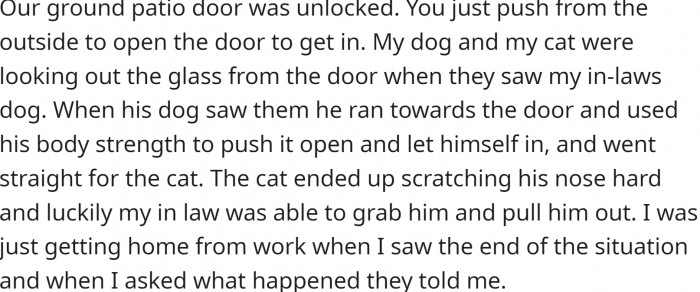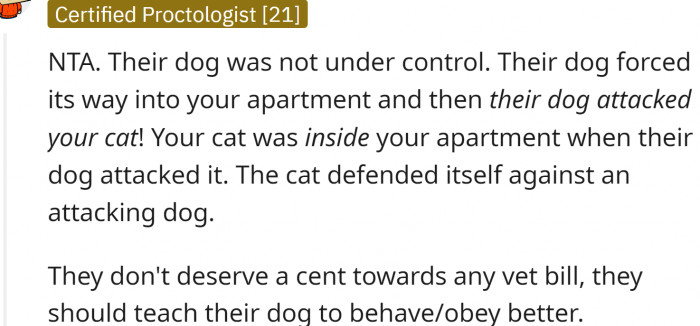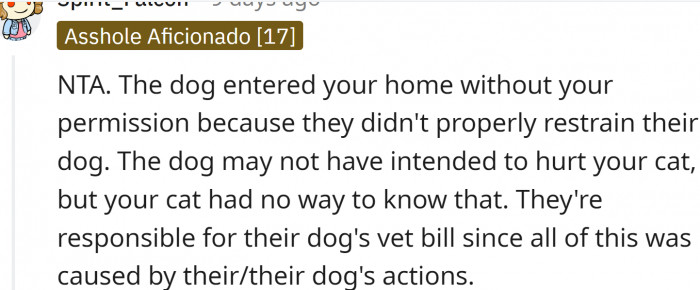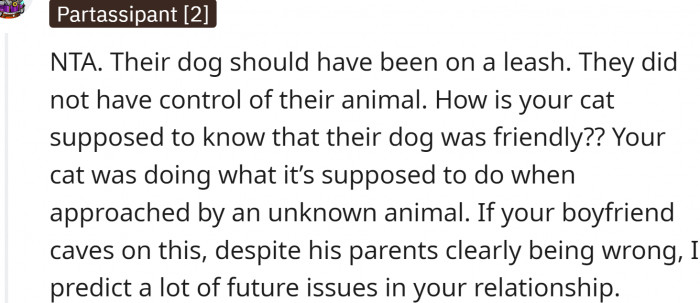Dog Enters Neighbor’s Home And Gets Scratched By A Cat, Now Its Owners Want Reimbursement For Vet Bills
Living in a multi-family building has its challenges, especially when all residents are related. The OP of today’s story has a complicated living situation:
“I live in a house with 3 suites, each occupied by 3 different couples, myself and my partner included. We live on the second floor, my partner’s middle brother, his wife, and son on the main floor, and the younger brother, his partner, and dog above the garage suite.”
So, basically, three brothers with their families in one multi-level house. With that many family members living so close to each other, you can’t ever be bored.
One of these situations was shared by a Redditor going by the name u/ngd1988. She asks, “AITA for telling my in-laws I will not be paying for their dog’s vet visit after my cat scratched his nose?”
She continues: “Yesterday, my partner was out doing some landscaping work. His brother’s dog saw him and ran over to say hi since he was not on a leash when getting out of the car.”
The dog ran into her home, where it found their cat and dog. Once it approached the cat, it scratched its nose while trying to defend itself.
OP continues: “Later on, I got a message from both in-laws saying that their dog’s nose looks a bit infected from the cat scratch and made a comment about me covering vet costs since my cat attacked their dog.”
I was furious with their request, to say the least, and told them it was my cat and dog’s territory that their dog came into, and my cat was only trying to defend himself while their dog came at mine.”
OP asks:

Three brothers with their families in one multi-level house. With that many family members living so close to each other, you can’t ever be bored.

OP's partner was doing some landscaping work when his brother's dog came to say hi

Understanding Animal Behavior and Human Responsibility
The incident involving a dog entering a neighbor's home only to be scratched by a cat raises important questions about animal behavior and owner responsibility.
Dr. John Smith, a behavioral psychologist, notes that animals often act out of instinct, and their interactions can be unpredictable.
Research shows that stress levels in animals can escalate in unfamiliar environments, leading to potentially aggressive interactions.
The Dynamics of Pet Ownership and Conflict
The incident illustrates the complexities surrounding pet ownership and the emotional bonds formed between animals and their humans. From a psychological standpoint, pets are often viewed as family members, and their well-being can evoke strong emotional responses in their owners.
According to research published in the Journal of Applied Animal Welfare Science, pet owners frequently experience heightened anxiety when their pets are harmed, which can lead to conflict in relationships, especially when financial implications are involved.
OP's patio was unlocked, and the dog came in. Her pets were inside. When the intruder dog approached the cat, it got scratched on the nose.

Now the dog owners want OP to pay for the vet visit

They claim their dog didn't do any harm - he just wanted to say hi

From a psychological perspective, the owners' desire for reimbursement highlights a common cognitive bias known as the 'just-world hypothesis'.
This bias leads individuals to believe that people get what they deserve, making them less sympathetic to situations where harm occurs unexpectedly.
Studies suggest that when individuals feel wronged, they may react defensively, asserting claims for compensation even when the situation was not entirely their fault.
The concept of responsibility in pet ownership is critical here. Many pet owners feel a strong sense of duty to protect their pets, and this can lead to feelings of anger or betrayal when other individuals fail to consider their pet's safety. Studies in behavioral psychology suggest that these feelings can lead to a defensive response when pet owners feel their rights are being violated.
Understanding this emotional landscape can help in navigating disputes and finding resolutions that acknowledge the feelings of all parties involved.
OP has texts where the dog owners say that dog entered her home, just in case they go legal on her

OP refused to pay and now things are awkward for them

Redditors agree:

Legal Implications in Animal Interactions
There are significant legal implications surrounding pet ownership and liability for injuries caused by animals.
According to the American Veterinary Medical Association, pet owners are generally responsible for their animals' actions, particularly if they can be shown to have a history of aggression or other behavioral issues.
This legal framework often leads to disputes similar to this situation, where one party feels entitled to compensation for unexpected incidents involving pets.
Financial Implications and Emotional Reactions
Financial stress often compounds emotional responses during conflicts involving pets. Research from the American Psychological Association indicates that financial disputes can trigger anxiety and stress, affecting decision-making processes.
In situations like this, it's essential for both parties to communicate openly about their feelings and financial expectations to mitigate conflict and resentment.
The dog entered her home.

How was the cat supposed to know that the dog was just saying hi?

How can the owners be sure their dog just wanted to say hi?

Practical solutions in such disputes often involve mediation to facilitate communication between the involved parties.
Experts suggest that open dialogue can help both sides reach a mutual understanding, reducing hostility and the potential for ongoing conflict.
Additionally, pet owners should take proactive measures to ensure their pets are safe and secure to avoid similar incidents in the future.
Effective communication strategies can be key to resolving such disputes. According to psychologists, employing 'I' statements, such as 'I feel concerned about my dog's health,' can help in expressing feelings without assigning blame. This approach can lead to more constructive conversations.
Additionally, mediation may be a beneficial route for parties unable to reach an agreement, as a neutral third party can facilitate understanding and compromise.
The dog is a pit bull. They can be pretty scary, even when they are friendly.

Dog owners should train their dogs

Play stupid games, and win stupid prizes. Every responsible dog owner knows that dogs must be trained.
And not going into other people’s homes is one big part of that training. We can’t really understand these people who let their dogs misbehave and then complain about the consequences. Can you?
Navigating Emotional Responses
Understanding emotional triggers in pet ownership conflicts can lead to healthier resolutions. The Journal of Veterinary Behavior highlights that pet owners often project their emotions onto their pets, which can intensify feelings during disputes.
Recognizing these emotional dynamics can guide pet owners toward more empathetic interactions, ultimately leading to amicable solutions.
Psychological Analysis
This situation reveals how deeply intertwined our emotions can become with our pets, reflecting our attachment styles. When an animal is harmed, it often elicits a protective response that can lead to conflict, especially when financial considerations arise. Understanding this dynamic is crucial for resolving disputes amicably.
Analysis generated by AI
Analysis & Alternative Approaches
Ultimately, navigating pet-related conflicts requires a mix of understanding emotional triggers and effective communication skills. Research shows that resolving conflicts in a constructive manner can enhance relationships and lead to better outcomes for all involved, including the pets.
Therapeutic approaches that incorporate emotional awareness and conflict resolution strategies can also foster healthier interactions among pet owners.
The Role of Empathy in Resolving Conflicts
Empathy plays a crucial role in conflict resolution, especially in situations involving pets where emotions can run high.
Research in social psychology emphasizes the importance of perspective-taking, where individuals can understand the feelings and motivations of others.
By fostering empathy, parties involved can often find common ground and work towards a solution that acknowledges the emotional stakes of both sides.
Analysis & Alternative Approaches
Situations like this underscore the complexities of pet ownership and the psychological factors involved in conflicts over animal behavior.
As highlighted by the American Psychological Association, understanding these dynamics can lead to more constructive resolutions in disputes.



